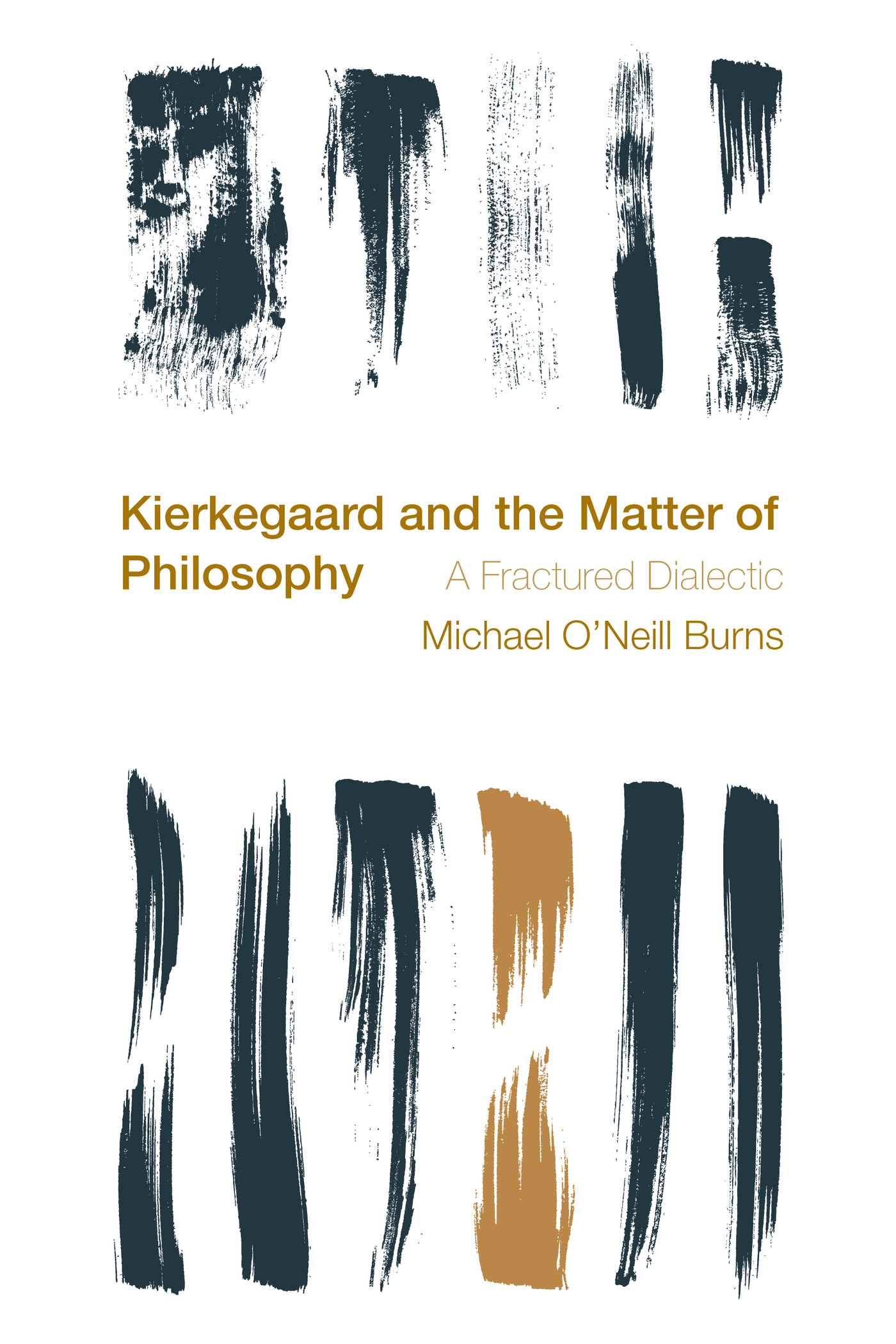Kierkegaard and
the Matter of Philosophy
Reframing the Boundaries
Series editors: Alison Assiter
and Evert van der Zweerde
Reframing the Boundaries This series aims to mine the rich resources of philosophers in the continental tradition for their contributions to thinking the political. It fills a gap in the literature by suggesting that the work of a wider range of philosophers than those normally associated with this sphere of work can be of relevance to the political.
Titles in the Series
Kierkegaard and the Matter of Philosophy, by Michael ONeill Burns
Arendt, Levinas and a Politics of Relationality, by Anya Topolski (forthcoming)
The Risk of Freedom, by Francesco Tava (forthcoming)
Kierkegaard and
the Matter of Philosophy
A Fractured Dialectic
Michael ONeill Burns

London New York
Published by Rowman & Littlefield International, Ltd.
Unit A, Whitacre Mews, 26-34 Stannary Street, London SE11 4AB
www.rowmaninternational.com
Rowman & Littlefield International, Ltd. is an affiliate of Rowman & Littlefield
4501 Forbes Boulevard, Suite 200, Lanham, Maryland 20706, USA
With additional offices in Boulder, New York, Toronto (Canada), and London (UK)
www.rowman.com
Copyright 2015 by Michael ONeill Burns
All rights reserved. No part of this book may be reproduced in any form or by any electronic or mechanical means, including information storage and retrieval systems, without written permission from the publisher, except by a reviewer who may quote passages in a review.
British Library Cataloguing in Publication Information Available
A catalogue record for this book is available from the British Library
ISBN: HB 978-1-78348-202-3
ISBN: PB 978-1-78348-203-0
ISBN: EB 978-1-78348-204-7
Library of Congress Cataloging-in-Publication Data
Burns, Michael O'Neill.
Kierkegaard and the matter of philosophy : a fractured dialectic / Michael O'Neill Burns.
pages cm. (Reframing the boundaries)
Includes bibliographical references and index.
ISBN 978-1-78348-202-3 (cloth : alk. paper) ISBN 978-1-78348-203-0 (pbk. : alk. paper) ISBN 978-1-78348-204-7 (ebook : alk. paper)
1. Kierkegaard, Sren, 18131855. 2. Idealism, German. 3. Continental philosophyEuropeHistory21st century. I. Title.
B4377.O54 2014
198'.9dc23
2014036548
 TM The paper used in this publication meets the minimum requirements of American National Standard for Information Sciences Permanence of Paper for Printed Library Materials, ANSI/NISO Z39.48-1992.
TM The paper used in this publication meets the minimum requirements of American National Standard for Information Sciences Permanence of Paper for Printed Library Materials, ANSI/NISO Z39.48-1992.
Printed in the United States of America
Acknowledgements
This work began in the Department of Philosophy at the University of Dundee where I was both challenged and encouraged by John Maoilearca, James Williams, Beth Lord, Brian Smith, Dominic Smith and especially Rachel Jones. The postgraduate community at Dundee offered a constant source of friendship, debate and good spirits, without which this work would have been impossible. The friendship and conversation of Alex Andrews, Dave Mesing, John Van Houdt, Thomas Lynch, Anthony Paul Smith and Daniel Whistler served as a constant source of motivation and inspiration. Many thanks to the staff of the Hong Kierkegaard Library at St. Olaf College, and in particular Gordon Marino and Cynthia Wales Lund, for providing a wonderful intellectual home away from home. I am especially thankful to Alison Assiter, Maria J. Binetti, Adrian Johnston and Steven Shakespeare for their encouragement, friendship and philosophical inspiration. I owe a great deal to each of them and this book would not exist (either conceptually or materially) without them. Finally, I owe much to the friends and family whose love keeps me sane: Jeanne and Jennifer Burns, Alicia Harvey, Matthew Bear Kronz, Philipe Navarro and Dan Olson.
This book is dedicated to Thomas E. Burns.
Notes on Sources
All references to Kierkegaards work (with the exception of The Present Age) are to the Princeton University Press edition of Kierkegaards Writings, edited by Howard V. and Edna W. Hong. Abbreviations to these texts, which will follow quotations in parenthesis and include page numbers, follow the nomenclature below.
CA | The Concept of Anxiety. Trans. Reidar Thomate and Albert A. Anderson. Princeton University Press, 1980. |
CI | The Concept of Irony. Trans. Howard V. Hong and Edna W. Hong. Princeton University Press, 1989. |
CUP | Concluding Unscientific Postscript to Philosophical Fragments. Trans. Howard V. Hong and Edna W. Hong. Princeton University Press, 1992. |
FSE | For Self-Examination; Judge for Yourself! Trans. Howard V. Hong and Edna W. Hong. Princeton University Press, 1900. |
FTR | Fear and Trembling and Repetition. Trans. Howard V. Hong and Edna W. Hong. Princeton University Press, 1983. |
PA | The Present Age. Trans. Alexander Dru. Harper & Row, 1962. |
PC | Practice in Christianity. Trans. Howard V. Hong and Edna W. Hong. Princeton University Press, 1991. |
PF/JC | Philosophical Fragments and Johannes Climacus. Trans. Howard V. Hong and Edna W. Hong. Princeton University Press, 1985. |
SUD | The Sickness Unto Death. Trans. Howard V. Hong and Edna W. Hong. Princeton University Press, 1980. |
TA | Two Ages. Trans. Howard V. Hong and Edna W. Hong. Princeton University Press, 1978. |
WL | Works of Love. Trans. Howard V. Hong and Edna W. Hong. Princeton University Press, 1998. |
Introduction
In the past two decades, there has been a drastic transition in the overall aim and theoretical orientation of continental European philosophy. At the beginning of this transitional period, a certain sort of postmodernism still dominated much of the discourse of what was considered continental philosophy. This theoretical outlook inaugurated a period of discourse focused on the deconstruction of texts, the rethinking of traditional forms of ethics and a tendency to focus on latently theological concepts such as the neighbour, the other, alterity and the ineffable. Many of the figures traditionally associated with this tendency follow a loosely post-Heideggerian phenomenological tradition, including the likes of Jacques Derrida and Emmanuel Levinas. Such figures share in common a generally post-metaphysical orientation, in which both the possibilities of speaking about and gaining access to a necessary metaphysical structure or ontological absolute are denied.
It is thus not surprising that one of the common intellectual sources shared by many of the postmodern philosophers was Sren Kierkegaard, the anti-philosophical thinker whose religious insistence on the single individual before God stood in absolute opposition to the overarching metaphysical totalization of the Hegelian system. Many of these figures followed Heidegger in assuming that Kierkegaard had little to offer in way of a systematic ontology, but much to offer in terms of a pure existential account of human existence. If Kierkegaard was given new life in postmodern philosophy, the systematic thinkers of German idealism did not fare as well. The overarching metaphysical narrative underlying the idealist tradition, which attempted to give a systematic account of self and world, seemed to lose significance in the wake of the eulogy to classical metaphysics collectively authored by the philosophical voices of postmodernity. If the postwar European philosophical situation was largely faced with an either/or between German idealist metaphysics and existential-phenomenology, it seems that postmodern philosophy chose the latter tradition.

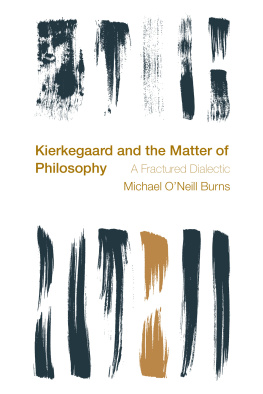
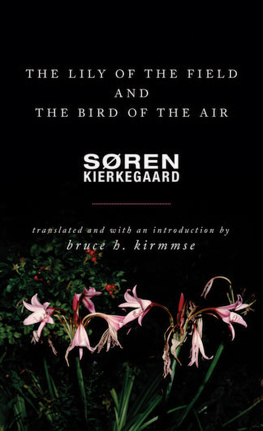
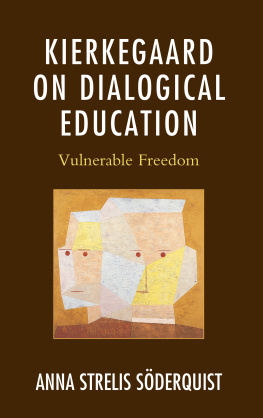


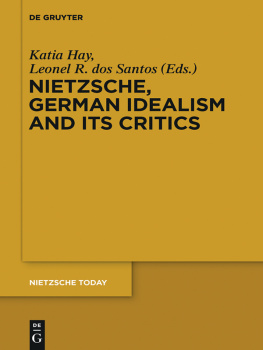
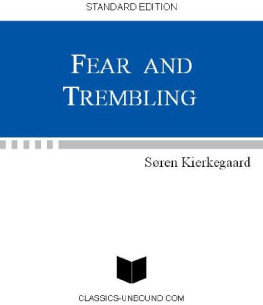


 TM The paper used in this publication meets the minimum requirements of American National Standard for Information Sciences Permanence of Paper for Printed Library Materials, ANSI/NISO Z39.48-1992.
TM The paper used in this publication meets the minimum requirements of American National Standard for Information Sciences Permanence of Paper for Printed Library Materials, ANSI/NISO Z39.48-1992.